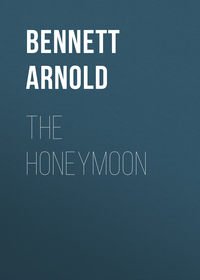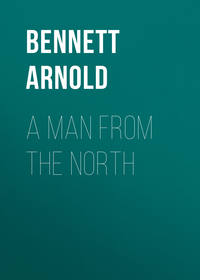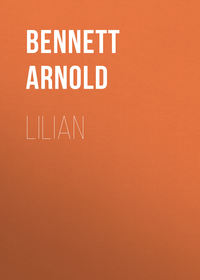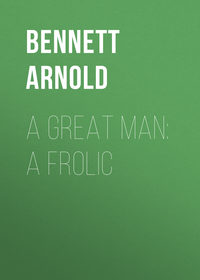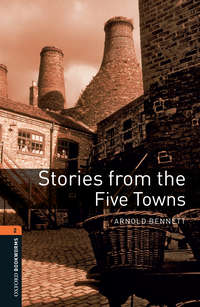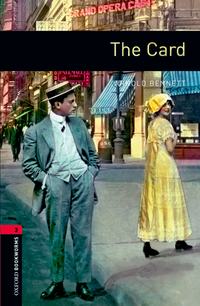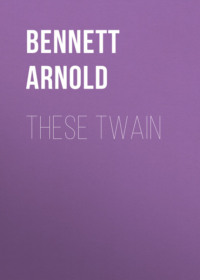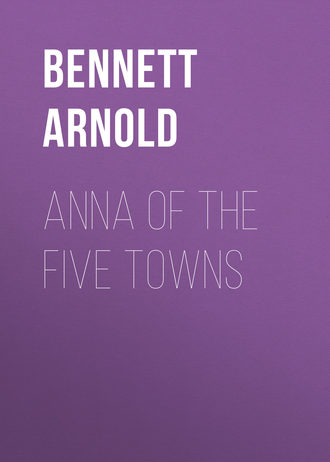 полная версия
полная версияAnna of the Five Towns
'See!' Mynors exclaimed, touching her arm.
The huge disc of the moon was rising in the east, and as this mild lamp passed up the sky, the sense of universal quiescence increased. Lovely, Anna had said. It was the loveliest sight her eyes had ever beheld, a panorama of pure beauty transcending all imagined visions. It overwhelmed her, thrilled her to the heart, this revelation of the loveliness of the world. Her thoughts went back to Hanbridge and Bursley and her life there; and all the remembered scenes, bathed in the glow of a new ideal, seemed to lose their pain. It was as if she had never been really unhappy, as if there was no real unhappiness on the whole earth. She perceived that the monotony, the austerity, the melancholy of her existence had been sweet and beautiful of its kind, and she recalled, with a sort of rapture, hours of companionship with the beloved Agnes, when her father was equable and pacific. Nothing was ugly nor mean. Beauty was everywhere, in everything.
In silence they began to descend, perforce walking quickly because of the steep gradient. At the first cottage they saw a little girl in a mob-cap playing with two kittens.
'How like Agnes!' Mynors said.
'Yes. I was just thinking so,' Anna answered.
'I thought of her up on the hill,' he continued. 'She will miss you, won't she?'
'I know she cried herself to sleep last night. You mightn't guess it, but she is extremely sensitive.'
'Not guess it? Why not? I am sure she is. Do you know – I am very fond of your sister. She's a simply delightful child. And there's a lot in her, too. She's so quick and bright, and somehow like a little woman.'
'She's exactly like a woman sometimes,' Anna agreed. 'Sometimes I fancy she's a great deal older than I am.'
'Older than any of us,' he corrected.
'I'm glad you like her,' Anna said, content. 'She thinks all the world of you.' And she added: 'My word, wouldn't she be vexed if she knew I had told you that!'
This appreciation of Agnes brought them into closer intimacy, and they talked the more easily of other things.
'It will freeze to-night,' Mynors said; and then, suddenly looking at her in the twilight: 'You are feeling chill.'
'Oh, no!' she protested.
'But you are. Put this muffler round your neck.' He took a muffler from his pocket.
'Oh, no, really! You will need it yourself.' She drew a little away from him, as if to avoid the muffler.
'Please take it.'
She did so, and thanked him, tying it loosely and untidily round her throat. That feeling of the untidiness of the muffler, of its being something strange to her skin, something with the rough virtue of masculinity, which no one could detect in the gloom, was in itself pleasant.
'I wager Mrs. Sutton has a good fire burning when we get in,' he said.
She thought with joyous anticipation of the warm, bright, sitting-room, the supper, and the vivacious good-natured conversation. Though the walk was nearly at an end, other delights were in store. Of the holiday, thirteen complete days yet remained, each to be as happy as the one now closing. It was an age! At last they entered the human cosiness of the village. As they walked up the steps of their lodging and he opened the door for her, she quickly drew off the muffler and returned it to him with a word of thanks.
On Monday morning, when Beatrice and Anna came downstairs, they found the breakfast odorously cooling on the table, and nobody in the room.
'Where are they all, I wonder. Any letters?' Beatrice said.
'There's your mother, out on the front – and Mr. Mynors too.'
Beatrice threw up the window, and called: 'Come along, Henry; come along, mother. Everything's going cold.'
'Is it?' Mynors cheerfully replied. 'Come out here, both of you, and begin the day properly with a dose of ozone.'
'I loathe cold bacon,' said Beatrice, glancing at the table, and they went out into the road, where Mrs. Sutton kissed them with as much fervour as if they had arrived from a long journey.
'You look pale, Anna,' she remarked.
'Do I?' said Anna, 'I don't feel pale.'
'It's that long walk last night,' Beatrice put in. 'Henry always goes too far.'
'I don't – ' Anna began; but at that moment Mr. Sutton, lumbering and ponderous, joined the party.
'Henry,' he said, without greeting anyone, 'hast noticed those half-finished houses down the road yonder by the "Falcon"? I've been having a chat with Kelly, and he tells me the fellow that was building them has gone bankrupt, and they're at a stand-still. The Receiver wants to sell 'em. In fact Kelly says they're going cheap. I believe they'd be a good spec.'
'Eh, dear!' Mrs. Sutton interrupted him. 'Father, I wish you would leave your specs alone when you're on your holiday.'
'Now, missis!' he affectionately protested, and continued: 'They're fairly well built, seemingly, and the rafters are on the roof. Anna,' he turned to her quickly, as if counting on her sympathy, 'you must come with me and look at 'em after breakfast. Happen they might suit your father – or you. I know your father's fond of a good spec.'
She assented with a ready smile. This was the beginning of a fancy which the Alderman always afterwards showed for Anna.
After breakfast Mrs. Sutton, Beatrice, and Anna arranged to go shopping:
'Father – brass,' Mrs. Sutton ejaculated in two monosyllables to her husband.
'How much will content ye?' he asked mildly.
'Give me five or ten pounds to go on with.'
He opened the left-hand front pocket of his trousers – a pocket which fastened with a button; and leaning back in his chair drew out a fat purse, and passed it to his wife with a preoccupied air. She helped herself, and then Beatrice intercepted the purse and lightened it of half a sovereign.
'Pocket-money,' Beatrice said; 'I'm ruined.'
The Alderman's eyes requested Anna to observe how he was robbed. At last the purse was safely buttoned up again.
Mrs. Sutton's purchases of food at the three principal shops of the village seemed startlingly profuse to Anna, but gradually she became accustomed to the scale, and to the amazing habit of always buying the very best of everything, from beefsteak to grapes. Anna calculated that the housekeeping could not cost less than six pounds a week for the five. At Manor Terrace three people existed on a pound. With her half-sovereign Beatrice bought a belt and a pair of sand-shoes, and some cigarettes for Henry. Mrs. Sutton bought a pipe with a nickel cap, such as is used by sailors. When they returned to the house, Mr. Sutton and Henry were smoking on the front. All five walked in a row down to the harbour, the Alderman giving an arm each to Beatrice and Anna. Near the 'Falcon' the procession had to be stopped in order to view the unfinished houses. Tom Kelly had a cabin partly excavated out of the rock behind the little quay. Here they found him entangled amid nets, sails, and oars. All crowded into the cabin and shook hands with its owner, who remarked with severity on their pallid faces, and insisted that a change of complexion must be brought about. Mynors offered him his tobacco-pouch, but on seeing the light colour of the tobacco he shook his head and refused it, at the same time taking from within his jersey a lump of something that resembled leather.
'Give him this, Henry,' Mrs. Sutton whispered, handing Mynors the pipe which she had bought.
'Mrs. Sutton wishes you to accept this,' said Mynors.
'Eh, thank ye,' he exclaimed. 'There's a leddy that knows my taste.' He cut some shreds from his plug with a clasp-knife and charged and lighted the pipe, filling the cabin with asphyxiating fumes.
'I don't know how you can smoke such horrid, nasty stuff,' said Beatrice, coughing.
He laughed condescendingly at Beatrice's petulant manner. 'That stuff of Henry's is boy's tobacco,' he said shortly.
It was decided that they should go fishing in the 'Fay.' There was a light southerly breeze, a cloudy sky, and smooth water. Under charge of young Tom Kelly, a sheepish lad of sixteen, with his father's smile, they all got into an inconceivably small dinghy, loading it down till it was almost awash. Old Tom himself helped Anna to embark, told her where to tread, and forced her gently into a seat at the stern. No one else seemed to be disturbed, but Anna was in a state of desperate fear. She had never committed herself to a boat before, and the little waves spat up against the sides in a most alarming way as young Tom jerked the dinghy along with the short sculls. She went white, and clung in silence fiercely to the gunwale. In a few moments they were tied up to the 'Fay,' which seemed very big and safe in comparison with the dinghy. They clambered on board, and in the deep well of the two-ton yacht Anna contrived to collect her wits. She was reassured by the painted legend in the well, 'Licensed to carry eleven.' Young Tom and Henry busied themselves with ropes, and suddenly a huge white sail began to ascend the mast; it flapped like thunder in the gentle breeze. Tom pulled up the anchor, curling the chain round and round on the forward deck, and then Anna noticed that, although the wind was scarcely perceptible, they were gliding quickly past the embankment. Henry was at the tiller. The next minute Tom had set the jib, and by this time the 'Fay' was approaching the breakwater at a great pace. There was no rolling or pitching, but simply a smooth, swift progression over the calm surface. Anna thought it the ideal of locomotion. As soon as they were beyond the breakwater and the sails caught the breeze from the Sound, the 'Fay' lay over as if shot, and a little column of green water flung itself on the lee coaming of the well. Anna screamed as she saw the water and felt the angle of the floor suddenly change, but when everyone laughed, she laughed too. Henry, noticing the whiteness of her knuckles as she gripped the coaming, explained the disconcerting phenomena. Anna tried to be at ease, but she was not. She could not for a long time dismiss the suspicion that all these people were foolishly blind to a peril which she alone had the sagacity to perceive.
They cruised about while Tom prepared the lines. The short waves chopped cheerfully against the carvel sides of the yacht; the clouds were breaking at a hundred points; the sea grew lighter in tone; gaiety was in the air; no one could possibly be indisposed in that innocuous weather. At length the lines were ready, but Tom said the yacht was making at least a knot too much for serious fishing, so Henry took a reef in the mainsail, showing Anna how to tie the short strings. The Alderman, lying on the fore-deck, was placidly smoking. The lines were thrown out astern, and Mrs. Sutton and Beatrice each took one. But they had no success; young Tom said it was because the sun had appeared.
'Caught anything?' Mr. Sutton inquired at intervals. After a time he said:
'Suppose Anna and I have a try?'
It was agreed.
'What must I do?' asked Anna, brave now.
'You just hold the line – so. And if you feel a little jerk-jerk, that's a mackerel.' These were the instructions of Beatrice. Anna was becoming excited. She had not held the line ten seconds before she cried out:
'I've got one.'
'Nonsense,' said Beatrice. 'Everyone thinks at first that the motion of the waves against the line is a fish.'
'Well,' said Henry, giving the tiller to young Tom. 'Let's haul in and see, anyway.' Before doing so he held the line for a moment, testing it, and winked at Anna. While Anna and Henry were hauling in, the Alderman, dropping his pipe, began also to haul in his own line with great fury.
'Got one, father?' Mrs. Sutton asked.
'Ay!'
Both lines came in together, and on each was a pounder. Anna saw her fish gleam and flash like silver in the clear water as it neared the surface. Henry held the line short, letting the mackerel plunge and jerk, and then seized and unhooked the catch.
'How cruel!' Anna cried, startled at the nearness of the two fish as they sprang about in an old sugar box at her feet. Young Tom laughed loud at her exclamation. 'They cairn't feel, miss,' he sniggered. Anna wondered that a mouth so soft and kind could utter such heartless words.
In an hour the united efforts of the party had caught nine mackerel; it was not a multitude, but the sun, in perfecting the weather, had spoilt the sport. Anna had ceased to commiserate the captured fish. She was obliged, however, to avert her head when Tom cut some skin from the side of one of the mackerel to provide fresh bait; this device seemed to her the extremest refinement of cruelty. Beatrice grew ominously silent and inert, and Mrs. Sutton glanced first at her daughter and then at her husband; the latter nodded.
'We'd happen better be getting back, Henry,' said the Alderman.
The 'Fay' swept home like a bird. They were at the quay, and Kelly was dragging them one by one from the black dinghy on to what the Alderman called terra-firma. Henry had the fish on a string.
'How many did ye catch, Miss Tellwright?' Kelly asked benevolently.
'I caught four,' Anna replied. Never before had she felt so proud, elated, and boisterous. Never had the blood so wildly danced in her veins. She looked at her short blue skirt which showed three inches of ankle, put forward her brown-shod foot like a vain coquette, and darted a covert look at Henry. When he caught it she laughed instead of blushing.
'Ye're doing well,' Tom Kelly approved. 'Ye'll make a famous mackerel-fisher.'
Five of the mackerel were given to young Tom, the other four preceded a fowl in the menu of dinner. They were called Anna's mackerel, and all the diners agreed that better mackerel had never been lured out of the Irish Sea.
In the afternoon the Alderman and his wife slept as usual, Mr. Sutton with a bandanna handkerchief over his face. The rest went out immediately; the invitation of the sun and the sea was far too persuasive to be resisted.
'I'm going to paint,' said Beatrice, with a resolute mien. 'I want to paint Bradda Head frightfully. I tried last year, but I got it too dark, somehow. I've improved since then. What are you going to do?'
'We'll come and watch you,' said Henry.
'Oh, no, you won't. At least you won't; you're such a critic. Anna can if she likes.'
'What! And me be left all afternoon by myself?'
'Well, suppose you go with him, Anna, just to keep him from being bored?'
Anna hesitated. Once more she had the uncomfortable suspicion that Mynors and herself were being manoeuvred.
'Look here,' said Mynors to Beatrice. 'Have you decided absolutely to paint?'
'Absolutely.' The finality of the answer seemed to have a touch of resentment.
'Then' – he turned to Anna – 'let's go and get that dinghy and row about the bay. Eh?'
She could offer no rational objection, and they were soon putting off from the jetty, impelled seaward by a mighty push from Kelly's arm. It was very hot. Mynors wore white flannels. He removed his coat, and turned up his sleeves, showing thick, hairy arms. He sculled in a manner almost dramatic, and the dinghy shot about like a water-spider on a brook. Anna had nothing to do except to sit still and enjoy. Everything was drowned in dazzling sunlight, and both Henry and Anna could feel the process of tanning on their faces. The bay shimmered with a million diamond points; it was impossible to keep the eyes open without frowning, and soon Anna could see the beads of sweat on Henry's crimson brow.
'Warm?' she said. This was the first word of conversation. He merely smiled in reply. Presently they were at the other side of the bay, in a cave whose sandy and rock-strewn floor trembled clear under a fathom of blue water. They landed on a jutting rock; Henry pushed his straw hat back, and wiped his forehead. 'Glorious! glorious!' he exclaimed. 'Do you swim? No? You should get Beatrice to teach you. I swam out here this morning at seven o'clock. It was chilly enough then. Oh! I forgot, I told you at breakfast.'
She could see him in the translucent water, swimming with long, powerful strokes. Dozens of boats were moving lazily in the bay, each with a cargo of parasols.
'There's a good deal of the sunshade afloat,' he remarked. 'Why haven't you got one? You'll get as brown as Tom Kelly.'
'That's what I want,' she said.
'Look at yourself in the water there,' he said, pointing to a little pool left on the top of the rock by the tide. She did so, and saw two fiery cheeks, and a forehead divided by a horizontal line into halves of white and crimson; the tip of the nose was blistered.
'Isn't it disgraceful?' he suggested.
'Why,' she exclaimed, 'they'll never know me when I get home!'
It was in such wise that they talked, endlessly exchanging trifles of comment. Anna thought to herself: 'Is this love-making?' It could not be, she decided; but she infinitely preferred it so. She was content. She wished for nothing better than this apparently frivolous and irresponsible dalliance. She felt that if Mynors were to be tender, sentimental, and serious, she would become wretchedly self-conscious.
They re-embarked, and, skirting the shore, gradually came round to the beach. Up above them, on the cliffs, they could discern the industrious figure of Beatrice, with easel and sketching-umbrella, and all the panoply of the earnest amateur.
'Do you sketch?' she asked him.
'Not I!' he said scornfully.
'Don't you believe in that sort of thing, then?'
'It's all right for professional artists,' he said; 'people who can paint. But – Well, I suppose it's harmless for the amateurs – finds them something to do.'
'I wish I could paint, anyway,' she retorted.
'I'm glad you can't,' he insisted.
When they got back to the cliffs, towards tea-time, Beatrice was still painting, but in a new spot. She seemed entirely absorbed in her work, and did not hear their approach.
'Let's creep up and surprise her,' Mynors whispered. 'You go first, and put your hands over her eyes.'
'Oh!' exclaimed Beatrice, blindfolded; 'how horrid you are, Henry! I know who it is – I know who it is.'
'You just don't, then,' said Henry, now in front of her. Anna removed her hands.
'Well, you told her to do it, I'm sure of that. And I was getting on so splendidly! I shan't do another stroke now.'
'That's right,' said Henry. 'You've wasted quite enough time as it is.'
Beatrice pouted. She was evidently annoyed with both of them. She looked from one to the other, jealous of their mutual understanding and agreement. Mr. and Mrs. Sutton issued from the house, and the five stood chatting till tea was ready; but the shadow remained on Beatrice's face. Mynors made several attempts to laugh it away, and at dusk these two went for a stroll to Port St. Mary. They returned in a state of deep intimacy. During supper Beatrice was consciously and elaborately angelic, and there was that in her voice and eyes, when sometimes she addressed Mynors, which almost persuaded Anna that he might once have loved his cousin. At night, in the bedroom, Anna imagined that she could detect in Beatrice's attitude the least shade of condescension. She felt hurt, and despised herself for feeling hurt.
So the days passed, without much variety, for the Suttons were not addicted to excursions. Anna was profoundly happy; she had forgotten care. She agreed to every suggestion for amusement; each moment had its pleasure, and this pleasure was quite independent of the thing done; it sprang from all activities and idlenesses. She was at special pains to fraternise with Mr. Sutton. He made an interesting companion, full of facts about strata, outcrops, and breaks, his sole weakness being the habit of quoting extremely sentimental scraps of verse when walking by the sea-shore. He frankly enjoyed Anna's attention to him, and took pride in her society. Mrs. Sutton, that simple heart, devoted herself to the attainment of absolute quiescence. She had come for a rest, and she achieved her purpose. Her kindliness became for the time passive instead of active. Beatrice was a changing quantity in the domestic equation. Plainly her parents had spoiled their only child, and she had frequent fits of petulance, particularly with Mynors; but her energy and spirits atoned well for these. As for Mynors, he behaved exactly as on the first Monday. He spent many hours alone with Anna – (Beatrice appeared to insist on leaving them together, even while showing a faint resentment at the loneliness thus entailed on herself) – and his attitude was such as Anna, ignorant of the ways of brothers, deemed a brother might adopt.
On the second Monday an incident occurred. In the afternoon Mr. Sutton had asked Beatrice to go with him to Port St. Mary, and she had refused on the plea that the light was of a suitable grey for painting. Mr. Sutton had slipped off alone, unseen by Anna and Henry, who had meant to accompany him in place of Beatrice. Before tea, while Anna, Beatrice and Henry were awaiting the meal in the parlour, Mynors referred to the matter.
'I hope you've done some decent work this afternoon,' he said to Beatrice.
'I haven't,' she replied shortly; 'I haven't done a stroke.'
'But you said you were going to paint hard!'
'Well, I didn't.'
'Then why couldn't you have gone to Port St. Mary, instead of breaking your fond father's heart by a refusal?'
'He didn't want me, really.'
Anna interjected: 'I think he did, Bee.'
'You know you're very self-willed, not to say selfish,' Mynors said.
'No, I'm not,' Beatrice protested seriously. 'Am I, Anna?'
'Well – ' Anna tried to think of a diplomatic pronouncement. Beatrice took offence at the hesitation.
'Oh! You two are bound to agree, of course. You're as thick as thieves.'
She gazed steadily out of the window, and there was a silence. Mynors' lip curled.
'Oh! There's the loveliest yacht just coming into the bay,' Beatrice cried suddenly, in a tone of affected enthusiasm. 'I'm going out to sketch it.' She snatched up her hat and sketching-block, and ran hastily from the room. The other two saw her sitting on the grass, sharpening a pencil. The yacht, a large and luxurious craft, had evidently come to anchor for the night.
Mrs. Sutton arrived from her bedroom, and then Mr. Sutton also came in. Tea was served. Mynors called to Beatrice through the window and received no reply. Then Mrs. Sutton summoned her.
'Go on with your tea,' Beatrice shouted, without turning her head. 'Don't wait for me. I'm bound to finish this now.'
'Fetch her, Anna dear,' said Mrs. Sutton after another interval. Anna rose to obey, half-fearful.
'Aren't you coming in, Bee?' She stood by the sketcher's side, and observed nothing but a few meaningless lines on the block.
'Didn't you hear what I said to mother?'
Anna retired in discomfiture.
Tea was finished. They went out, but kept at a discreet distance from the artist, who continued to use her pencil until dusk had fallen. Then they returned to the sitting-room, where a fire had been lighted, and Beatrice at length followed. As the others sat in a circle round the fire, Beatrice, who occupied the sofa in solitude, gave a shiver.
'Beatrice, you've taken cold,' said her mother, sitting out there like that.'
'Oh, nonsense, mother – what a fidget you are!'
'A fidget I certainly am not, my darling, and that you know very well. As you've had no tea, you shall have some gruel at once, and go to bed and get warm.'
'Oh no, mother!' But Mrs. Sutton was resolved, and in half an hour she had taken Beatrice to bed and tucked her up.
When Anna went to the bedroom Beatrice was awake.
'Can't you sleep?' she inquired kindly.
'No,' said Beatrice, in a feeble voice, 'I'm restless, somehow.'
'I wonder if it's influenza,' said Mrs. Sutton, on the following morning, when she learnt from Anna that Beatrice had had a bad night, and would take breakfast in bed. She carried the invalid's food upstairs herself. 'I hope it isn't influenza,' she said later. 'The girl is very hot.'
'You haven't a clinical thermometer?' Mynors suggested.
'Go, see if you can buy one at the little chemist's,' she replied eagerly. In a few minutes he came back with the instrument.
'She's at over a hundred,' Mrs. Sutton reported, having used the thermometer. 'What do you say, father? Shall we send for a doctor? I'm not so set up with doctors as a general rule,' she added, as if in defence, to Anna. 'I brought Beatrice through measles and scarlet fever without a doctor – we never used to think of having a doctor in those days for ordinary ailments; but influenza – that's different. Eh, I dread it; you never know how it will end. And poor Beatrice had such a bad attack last Martinmas.'



